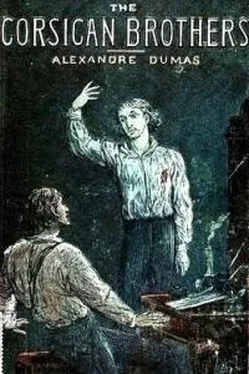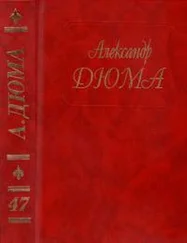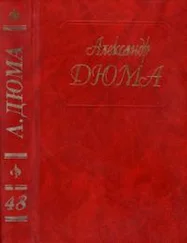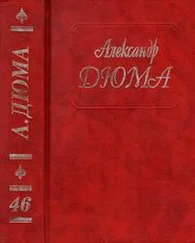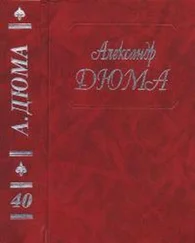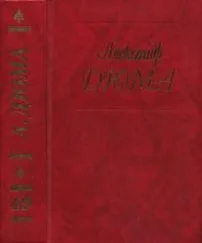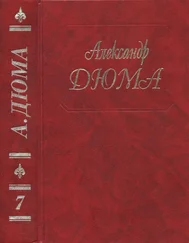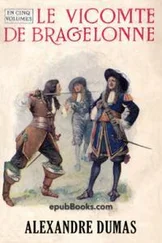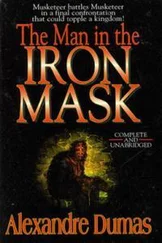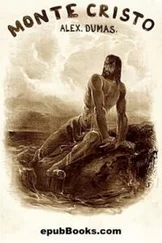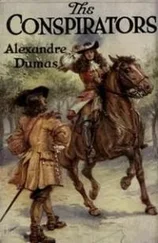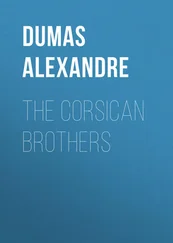"Ah, I understand," I said, as another prolonged howl rose through the night.
"Yes," I continued, "his master was shot, you say, and I suppose we are approaching the place where he was killed?"
"Just so, and Diamond has left us to go to Mucchio."
"That is where the man's tomb is?"
"Yes, that is to say, the monument which passers–by have raised to his memory, in the form of a cairn; so it follows that the tomb of the victim gradually grows larger, a symbol of the increasing vengeance of his relations."
Another long howl from Diamond's throat made me shudder again, though I was perfectly well aware of the cause of the noise.
At the next turn of the path we came upon the wayside tomb or cairn. A heap of stones formed a pyramid of four or five feet in height.
At the foot of this strange monument Diamond was lying with extended neck and open mouth. Lucien picked up a stone, and taking off his cap approached the mucchio.
I did the same, following his example closely.
When he had come close to the pyramid he broke a branch from a young oak and threw, first, the stone and then the branch upon the heap. He rapidly made the sign of the cross.
I imitated him exactly, and we resumed our route in silence, but Diamond remained behind.
About ten minutes afterwards we heard another dismal howling, and then almost immediately Diamond passed us, head and tail drooping, to a point about a hundred paces in front, when he suddenly resumed his hunting.
WE still kept advancing steadily, but, as Lucien had warned me, the path became rougher and more difficult.
I slung my gun over my shoulder, for I perceived that I should soon need both hands to assist me. As for my friend, he continued to press forward with the same easy gait, and did not appear to be at all inconvenienced by the difficult nature of the ground.
After some minutes' climbing over rocks, aided by bushes and roots, we reached a species of platform surmounted by some ruined walls. These ruins were those of the Castle of Vicentello d'Istria, our destination.
In about five minutes we had climbed up to the last terrace, Lucien in advance, and as he extended his hand to assist me he said:—
"Well done, well done; you have not climbed badly for a Parisian."
"Supposing that the Parisian you have assisted has already had some little experience in mountain scrambling?"
"Ah, true!" said Lucien, laughing. "Have you not a mountain near Paris called Montmartre?"
"Yes, but there are others beside Montmartre which I have ascended. For instance, the Rigi, the Faulhorn, the Gemmi, Vesuvius, Stromboli and Etna."
"Indeed! Now I suppose you will despise me because I have never done more than surmount Monte Rotundo! Well, here we are! Four centuries ago my ancestors would have opened the portal to you and bade you welcome to the castle. Now their descendants can only show you the place where the door used to be, and say to you, 'Welcome to the ruins!'"
"I suppose the chateau has been in possession of your family since the death of Vicentello d'Istria?" I said, taking up the conversation at the point at which we had dropped it previously.
"No, but before his birth. It was the last dwelling–place of our famous ancestress Savilia, the widow of Lucien de Franchi."
"Is there not some terrible history connected with this woman?"
"Yes; were it daylight I could now show you from this spot the ruins of the Castle of Valle. There lived the lord of Guidice, who was as much hated as she (Savilia) was beloved, as ugly as she was beautiful. He became enamoured of her, and as she did not quickly respond to his desires, he gave her to understand that if she did not accept him in a given time he would come and carry her off by force. Savilia made pretence of consenting, and invited Guidice to come to dinner at the castle. Guidice was overcome with joy at this, and forgetting that the invitation had only been extorted by menace, accepted it, and came attended only by a few body servants. The gate was closed behind them, and in a few minutes Guidice was a prisoner, and cast into a dungeon, yonder."
I passed on in the direction indicated, and found myself in a species of square court.
The moonlight streamed through the apertures time had made in the once solid walls, and threw dark and well–defined shadows upon the ground. All other portions of the ruins remained in the deep shade of the overhanging walls round about.
Lucien looked at his watch.
"Ah! we are twenty minutes too soon," he exclaimed. "Let us sit down; you are very likely tired."
We sat down; indeed, we extended ourselves at full length upon the grassy sward, in a position facing the great breach in the wall.
"But," said I to my companion, "it seems to me that you have not finished the story you began just now."
"No," replied Lucien. "Every morning and every evening Savilia came down to the dungeon in which Giudice was confined, and then separated from him only by a grating, she would undress herself, and expose herself naked to him, a captive.'
"'Giudice,' she would say, 'how do you expect that such an ugly man as you are can ever hope to possess all this?'
"This trial lasted for three months, and was repeated twice a day. But at the end of that period, thanks to a waiting woman whom he had bribed, Guidice was enabled to escape. He soon returned with all his men, who were much more numerous than those Savilia could assemble, and took the castle by assault, and having first possessed himself of Savilia, he subsequently exposed her naked in an iron cage at the cross roads in the Bocca di Cilaccia, offering, himself, the key to any passer by who might be tempted to enter. After three days of this public prostitution Savilia died."
"Well," I said, "it seems to me that your ancestors had a very pretty idea of revenging themselves, and that in finishing off their enemies with dagger or gunshot their descendants have in a manner degenerated!"
"Without mentioning that the day may come when we shall not kill them at all!" replied Lucien. "But it has not come to that yet. The two sons of Savilia," he continued, "who were at Ajaccio with their uncle, were true Corsicans, and continued to make war against the sons of Guidice. This war lasted for four hundred years, and only finished, as you saw, by the dates upon the carbines of my parents, on the 21st September, 1819, at eleven o'clock A.M."
"Oh, yes, I remember the inscription; but I had not time to inquire its meaning, as just then we were summoned to supper."
"Well, this is the explanation: Of the family of Guidice there remained, in 1819, only two brothers. Of the de Franchi family there remained only my father, who had married his cousin. Three months after that the Guidice determined to exterminate us with one stroke. One of the brothers concealed himself on the road to Olmedo to await my father's coming home to Sartène—while the other, taking advantage of his absence, determined to attack our house. This plan was carried out, but with a different result to what had been anticipated. My father, being warned of the plot, was on his guard; my mother, who had also got a hint of the affair, assembled the shepherds, etc., so that when the attack was made the intended victims were prepared for it—my father on the mountains, my mother in the mansion. The consequence was that the two Guidici fell, one shot by my father, the other by my mother. On seeing his foe fall, my father drew out his watch and saw it was eleven o'clock. When my mother shot her assailant she turned to the timepiece and noticed that it was also eleven o'clock. The whole thing had taken place exactly at the same moment. There were no more Guidici left, the family was extinct, and our victorious family is now left in peace; and considering we carried on a war for four hundred years, we didn't want to meddle with it any more. My father had the dates engraved upon the carbines, and hung the pieces up on each side of the clock, as you saw. Seven months later my mother gave birth to twins, of whom one is your very humble servant, the Corsican Lucien; the other, the philanthropist, Louis, his brother."
Читать дальше
